|
|
|
Sort Order |
|
|
|
Items / Page
|
|
|
|
|
|
|
| Srl | Item |
| 1 |
ID:
155358


|
|
|
|
|
| Summary/Abstract |
ANALYSIS OF THE HISTORY of the Russian policy with regard to South Slavic peoples generally boils down to considering Russian-Serbian relations, often unjustifiably leaving out the Slovenians, Croats, Macedonians and others. However, all these peoples have also strived to establish close relations with us and use Russian authority and influence in the struggle for the interests of their own, including, admittedly, in conflicts with each other. For many centuries, Russia has been developing contacts with these peoples, and their cultures kept intertwining.
|
|
|
|
|
|
|
|
|
|
|
|
|
|
|
|
| 2 |
ID:
151592
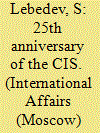

|
|
|
|
|
| Summary/Abstract |
Armen Oganesyan, Editor-in-Chief of International Affairs: This year, the CIS is 25 years old. There is a view that the CIS facilitated a civilized divorce of the Soviet republics. What do you think about it?
|
|
|
|
|
|
|
|
|
|
|
|
|
|
|
|
| 3 |
ID:
127065
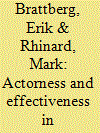

|
|
|
|
|
| Publication |
2013.
|
| Summary/Abstract |
This article examines the role of the European Union (EU) and United States as actors in international disaster relief. We take the analysis of 'actorness' one step further than normal by assessing the extent to which different aspects of EU and US actorness led to effectiveness in actual outcomes. In doing so, we make two contributions. First, we provide a rare comparison between EU and US foreign policy actorness, shedding light on the actor capability of each bloc in the area of international disaster relief. Second, we specify the relationship between actorness and effectiveness, a relationship which is too often assumed rather than explored. Using previous research of EU and US actorness as a starting point, we link four aspects of actorness to effectiveness and assess the resulting hypotheses using the case of the 2010 Haiti earthquake. We find support for our proposed links between actorness and effectiveness, although further research is needed before robust conclusions can be drawn.
|
|
|
|
|
|
|
|
|
|
|
|
|
|
|
|
| 4 |
|
| 5 |
ID:
134341
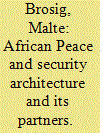

|
|
|
|
|
| Summary/Abstract |
This article presents survey data on the African Peace and Security Architecture (APSA). It focuses explicitly on two aspects: the internal constitution and achievements of the APSA; and coordination and cooperation with external actors, such as Regional Economic Communities, the United Nations and the European Union. The survey, conducted between October 2011 and December 2012, targeted 198 security experts in international organisations, think tanks, academia and non-governmental organisations. It reveals the APSA's current stage of development, achievements and challenges.
|
|
|
|
|
|
|
|
|
|
|
|
|
|
|
|
| 6 |
ID:
072699
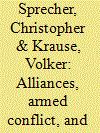

|
|
|
|
|
| Publication |
2006.
|
| Summary/Abstract |
Alliances are subject to many scholarly inquiries in international relations and peace research because they are major instruments of foreign and security policies. Since the early work on alliances produced by the Correlates of War (COW) project, there have been significant advances in conceptual, theoretical, and empirical alliance research. New typologies and data permit us to differentiate more thoroughly among a variety of alliance objectives and functions. Furthermore, there has been new theoretical and empirical research on alliance formation, alliance configuration/polarization, effects of alliances on military conflict, connections between alliances and trade, and the economics of alliances. Providing new theoretical approaches, data, and empirical evidence on alliances, this special issue includes articles that address alliance formation, alliance polarization, alliances and democratization, trade among allies, regional economic institutions with alliance obligations, and defense industrial policies of military alliances. The articles in this issue extend our understanding of alliances past the traditional realist balance-of-power framework and encourage further testing and refinement of older alliance arguments and extensions to new theoretical developments.
|
|
|
|
|
|
|
|
|
|
|
|
|
|
|
|
| 7 |
ID:
068736
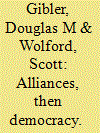

|
|
|
| 8 |
ID:
128975
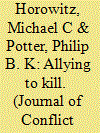

|
|
|
|
|
| Publication |
2014.
|
| Summary/Abstract |
Terrorist organizations do not operate in isolation. Instead, they forge alliances with one another, which generate a tight network of intergroup relationships. We argue that these relationships serve to increase group capacity, manifesting itself in the ability of a group to conduct deadly attacks. However, groups are notably judicious when they forge these cooperative ties, preferring to link to the strongest groups to which they have access. The result of this process of preferential attachment is a core/periphery structure in the broader network of alliances. Moreover, groups with ties to organizations at the core of the broader universe of relationships reap more rewards than those with large numbers of less meaningful alliances. Terrorism research and counterterrorism policy should assess terrorist organizations in the broader context of their interrelationships and depth of alliances rather than in isolation.
|
|
|
|
|
|
|
|
|
|
|
|
|
|
|
|
| 9 |
ID:
080836
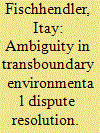

|
|
|
|
|
| Publication |
2008.
|
| Summary/Abstract |
Cooperation over transboundary environmental resources, water in particular, has been analyzed from various perspectives. Each study identifies the problems of cooperation differently and suggests different mechanisms to enhance it. Yet, the role of ambiguity, particularly significant in treaty design to resolve environmental disputes, has thus far been overlooked. Such a focus is warranted, since many international agreements regulating the use of natural resources are ambiguous in their schedule of resource delivery during crisis events or in their cost-sharing arrangements and may even include contradictory resource-allocation principles while remaining vague on how to settle the contradictions. This study aims to examine why, when, and how ambiguity is applied in agreements pertaining to natural resources, and water in particular. The Israeli-Jordanian peace agreement, which includes an annex on water-use regulation, is used as a case study. It was found that, under asymmetric power relations, when both sovereignty costs and uncertainty are high, several types of deliberate ambiguity were intentionally incorporated into the treaty. Some ambiguities allowed each side to present the treaty differently at home, thereby defusing domestic opposition, while others provided leeway to adjust the resource allocation during a future crisis without the need to renegotiate the treaty
|
|
|
|
|
|
|
|
|
|
|
|
|
|
|
|
| 10 |
ID:
180716
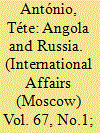

|
|
|
|
|
| Summary/Abstract |
COOPERATION is an essential tool for strengthening any country's position in the international arena, as well as for maintaining its political, economic and social stability.
|
|
|
|
|
|
|
|
|
|
|
|
|
|
|
|
| 11 |
ID:
166041
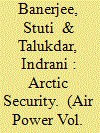

|
|
|
| 12 |
ID:
167369
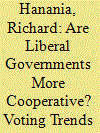

|
|
|
|
|
| Summary/Abstract |
Among both elites and the mass public, conservatives and liberal differ in their foreign policy preferences. Relatively little effort, however, has been put toward showing that, beyond the use of force, these differences affect the day-to-day outputs and processes of foreign policy. This article uses United Nations voting data from 1946 to 2008 of the five major Anglophone democracies of the United States, the United Kingdom, Canada, Australia, and New Zealand to show that each of these countries votes more in line with the rest of the world when liberals are in power. This can be explained by ideological differences between conservatives and liberals and the ways in which the socializing power of international institutions interact with preexisting ideologies. The results hope to encourage more research into the ways in which ideological differences among the masses and elites translate into differences in foreign policy goals and practices across governments.
|
|
|
|
|
|
|
|
|
|
|
|
|
|
|
|
| 13 |
ID:
147769
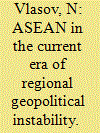

|
|
|
|
|
| Summary/Abstract |
THE ASSOCIATION of Southeast Asian Nations (ASEAN), set up by Indonesia, Malaysia, Singapore, Thailand, and the Philippines in 1967 under the Bangkok Declaration,1 has become an important actor in regional politics. Having extended its membership to Brunei in 1984, to Vietnam in 1995, to Laos and Myanmar in 1997,2 and to Cambodia in 1999, the association brings together ten countries with different economic and political systems. Today, ASEAN is a large market, an area with a population of more than 600 million3 (third place in the world), and a rapidly growing economy with a combined gross domestic product of more than $2.3 trillion4 (seventh place in the world).
|
|
|
|
|
|
|
|
|
|
|
|
|
|
|
|
| 14 |
ID:
072780
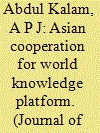

|
|
|
| 15 |
ID:
044230
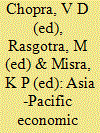

|
|
|
|
|
| Publication |
New Delhi, Continental Publishing House, 1988.
|
| Description |
xix, 158p.
|
| Series |
Southern Asia-pacific studies
|
|
|
|
|
|
|
|
|
|
|
|
Copies: C:1/I:0,R:0,Q:0
Circulation
| Accession# | Call# | Current Location | Status | Policy | Location |
| 029260 | 327.111095/CHO 029260 | Main | On Shelf | General | |
|
|
|
|
| 16 |
ID:
088933


|
|
|
|
|
| Publication |
2009.
|
| Summary/Abstract |
This article addresses the conflict over the Euphrates and Tigris waters from the perspective of negotiation theories, by examining the role of power in upstream/downstream negotiations. Conceptual and empirical links are established between water, negotiation (structure, process), power (asymmetries, coalition dynamics, strategies, development of alternatives) and security (direct/indirect interests such as national security, border security, territorial claims, economic development and environmental concerns). The study concludes that asymmetries in power have favored upstream/downstream interactions towards bilateral if not basin-wide arrangements. The framework shows that traditional elements of power, such as upstream positions, military and economic resources, do not constitute the only sources of power. Bargaining power can also determine the dynamics between respective riparians. Time constitutes an important source of power, and interests vary over time when political settings and security concerns shift. Downstream or more vulnerable riparians can invert situations of power asymmetry by acting on the basin-dominant riparian's interests and thus reduce its alternatives. Syria's use of 'issue-linkage' in its interactions with Turkey over water and wider security issues serves as the primary example.
|
|
|
|
|
|
|
|
|
|
|
|
|
|
|
|
| 17 |
ID:
183695
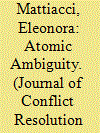

|
|
|
|
|
| Summary/Abstract |
How does dual-use technology influence cooperation? This study explores how the development of nuclear latency (the technological precursors to nuclear weapons) affects U.S. cooperative overtures toward its possessors. We argue that the ambiguous nature of nuclear latency creates uncertainty about the intentions of its possessors and impacts cooperation. Using event data, we find that a state’s possession of overt lab-scale enrichment and reprocessing facilities is significantly correlated with greater cooperative overtures from the United States toward that country. These overtures may serve as effective tools to counter nuclear proliferation among these states. Yet, when latent states engage in a concerted effort to keep their facilities secret, both at the lab and a more advanced “pilot” stage, this relationship is reversed. These results carry important implications for the impact of emerging, dual-use technologies on international security broadly.
|
|
|
|
|
|
|
|
|
|
|
|
|
|
|
|
| 18 |
ID:
082530
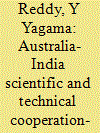

|
|
|
| 19 |
ID:
133061
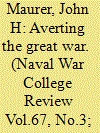

|
|
|
|
|
| Publication |
2014.
|
| Summary/Abstract |
Winston Churchill is best remembered as a valiant leader in times of war. He should also be remembered, however, for his efforts to prevent the catastrophic great wars that would scar the history of the twentieth century. While it is largely forgotten today, on the eve of the First World War Churchill made a remarkable attempt to halt the head-to-head competition in naval armaments that was setting Great Britain and Germany against one another as adversaries. In a bold and unconventional initiative, Churchill invited Germany's rulers to take a "holiday" from the competitive building of battleships. As the civilian head of Britain's Royal Navy, Churchill made public appeals for a naval holiday on three separate occasions before 1914. Behind the scenes too he pressed for the opening of negotiations with Germany, using the holiday proposal as the starting point for discussions. It was Churchill's earnest hope that the naval holiday would stop the action-reaction dynamic of the arms race-what statesmen of that era called "the sea war waged in the dockyards"-and reduce the antagonism between Britain and Germany. Rather than letting Britain and Germany be arrayed in opposing camps, he wanted to promote cooperation between Europe's two leading great powers.
|
|
|
|
|
|
|
|
|
|
|
|
|
|
|
|
| 20 |
ID:
129685
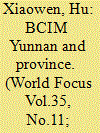

|
|
|
|
|
| Publication |
2014.
|
| Summary/Abstract |
BCIM (Bangladesh, China, India and Myanmar) forum for regional cooperation was jointly initiated by think tanks of China and India at the end of 1990s. on August of 1999, the first conference was held in Kunming and announced Kunming initiative, which opening the exploration of BCIM forums were convened persistently and alternately from 1999-2013 among four countries.
|
|
|
|
|
|
|
|
|
|
|
|
|
|
|
|
|
|
|
|
|